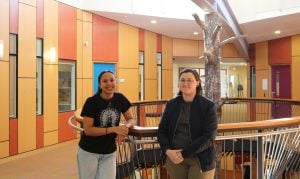The National Indigenous Knowledges Education Research and Innovation (NIKERI) Institute at Deakin University provides access to university for First Nations students through our distinctive Community Based Delivery (CBD) learning program. The CBD model offers a combination of on-campus study blocks and supported learning in home communities. This enables students the flexibility to maintain family, work, and fulfil cultural obligations while studying without having to relocate from home.
NIKERI’s Indigenous Direct Admissions Program (IDAP) will again be offered in November. The program is designed to provide applicants with the study skills to succeed, prepare them for university, and the experience of on-campus study blocks through the CBD model. Amelya See Kee, from Thursday Island in the Torres Strait attended the program last year and says it helped ease her concerns about transitioning to university study.
“You can come and do the IDAP program that will show you what NIKERI has to offer. [We were] shown the right referencing, essay writing and met other students which was really helpful to transition. That made it really easy to see myself coming to uni.”
With a history of more than 35 years of providing higher education opportunities to First Nations students, NIKERI is proud to have graduates from all states and territories in Australia working in health, education, arts, law, Indigenous research and environment management.
The unique learning environment at NIKERI brings together Aboriginal and Torres Strait Islander students from across Australia to share their individual perspectives and experiences. Surrounded in class with First Nations peers, students study in a space that prioritises First Nations Knowledges and cultural safety.
Final year, Bachelor of Early Childhood Education student Bonnie-Rose Taffe, a Wiradjuri woman from Albury, New South Wales, felt the CBD model would allow her to commence study while maintaining work and other commitments.
“As I was apprehensive to return to an education setting, I felt as though NIKERI was able to offer me a more culturally safe environment where I would be supported by other First Nations people and community.”
First year Bachelor of Nursing student, Amelya agrees.
“For me what makes NIKERI so appealing is that I can still live at home in community and work and I don’t have to move away from my connections to home and my family. I still have that option to be home and help and then NIKERI is another community and support.”
Admission to courses at NIKERI Institute is based on alternative entry. An ATAR or high school graduation certificate is not a necessity as other factors such as knowledge gained through experience are also considered. Bonnie-Rose adds that it is this value placed on students’ own knowledges and experiences that sets the Institute apart.
“This is in the way of their teaching style, their knowledge and also their understanding into the matters that First Nations students face in educational environments. It is very humbling to be on this journey with other First Nations students and have created our own community where we support one another.”
All prospective students who have completed an online application to NIKERI Institute are invited to attend the program. For more information about applying to the Institute contact our dedicated Student Services team via 03 5227 2538.

NIKERI students Amelya and Bonnie-Rose